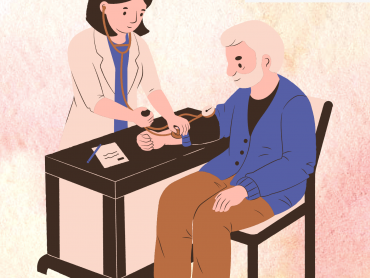“The very nature of their work, the profound impact it has on the lives of people and other concerns make mental health wellness of doctors, a valid concern.”
Imagine that today is your average hectic weekday morning. You are up and about, rushing through your daily chores. You go to wake up your 5-year-old daughter so that she can start getting ready for school. You find her bundled in her blanket, shivering and her tiny body burning up with fever. Immediately, your stress levels shoot up. You cancel all your appointments and rush her to your doctor with the expectation that not only he/she will prescribe her the much-needed dose of suitable medicine but, that you will also receive much-needed assurance from him/her. You hope your doctor can put your worry to rest. The ordeal continues through the week and finally after a few investigations, multiple consultations with your doctor and changes in medicines, finally all is well! It was one hell of a stressful week for you! But have you ever thought about what your doctor must have gone through? Have you ever thought that he/she might have been equally stressed but that he disguised his/her worry about the diagnosis in front of you? And that your doctor goes through this every week, every day, every minute of his/her career with the multiple patients? Food for thought isn’t it?
The very nature of their work, the profound impact it has on the lives of people and other concerns make mental health wellness of doctors, a valid concern. Today, the prevalence of stress, burnout, and depression is a reality among health professionals across the world. Still not convinced? Perhaps, the statistics listed below will do the job!
Before listing current statistics describing the mental health of health professionals across the world and in India, let us first understand its parameters such as the presence of stress and burnout under which it is studied. What is stress or occupational stress? Stress is a reaction to the demands being made on an individual. It does not automatically equate to a negative outcome. Some stress can be positive and can act as a trigger for success. When the demands of the situation exceed the individual’s ability or capacity to handle them appropriately, the result is negative. Occupational stress is a complex condition and is described as the sum of the physical, mental, and psychological responses to work that are transformed into negative emotional reactions.
 Burnout is a gradual progression in the deterioration of an individual’s mental state when he/she is exposed to chronic stress. Burnout is a psychological syndrome emerging as a prolonged response to chronic interpersonal stressors on the job. The three key dimensions of this response are overwhelming exhaustion, feelings of cynicism and detachment from the job, and a sense of ineffectiveness and lack of accomplishment. The significance of this three‐dimensional model is that it clearly places the individual stress experience within a social context and involves the person’s conception of both self and others.
Burnout is a gradual progression in the deterioration of an individual’s mental state when he/she is exposed to chronic stress. Burnout is a psychological syndrome emerging as a prolonged response to chronic interpersonal stressors on the job. The three key dimensions of this response are overwhelming exhaustion, feelings of cynicism and detachment from the job, and a sense of ineffectiveness and lack of accomplishment. The significance of this three‐dimensional model is that it clearly places the individual stress experience within a social context and involves the person’s conception of both self and others.
Coming to current figures, a systematic review published in 2018 based on data extracted from 182 studies conducted across 45 different countries reported prevalence of 67.0% (122/182) on overall burnout, 72.0% (131/182) on emotional exhaustion, 68.1% (124/182) on depersonalization, and 63.2% (115/182) on low personal accomplishment. Closer home in India, a study among 482 registered medical practitioners in India showed that 45.02% and 65.98% of the participants scored high on the emotional exhaustion and depersonalization scales, respectively, whereas 87.14% scored low on the personal accomplishment scale and 62.86% and 11.41% had medium and low scores on the satisfaction with the medical practice scale. Alarmingly, stress and burnout are not restricted to just seasoned medical professionals. A systematic review has shown prevalence rates for professional burnout ranging from 7.0% to 75.2%, depending on country-specific factors, applied instruments, cutoff-criteria for burnout symptomatology among medical students. Thus, even medical students are suffering from stress and burnout at a very tender age in their career.
What are the reasons for stress among medical professionals? Maybe, the gamut of emotions they experience such as the intense need to rescue a patient, a sense of failure and frustration when the patient’s illness progresses, feelings of powerlessness against illness and its associated losses, grief, or facing uncertainty in clinical practice. These emotions, powerful in nature, are capable of causing distress, arising from the doctor-patient relationship. Repeated exposure to these emotions and experience of distress do contribute to the high levels of stress doctors experience in their profession. Interference of their profession with the time they spend with their family is another factor which causes stress. There are other stressors too. Medico-legal concerns and also the need to keep updated with changes in medical knowledge and treatment modalities too add to their work burden. Personal characteristics such as self-critical nature, perfectionism, etc also contribute to stress. Organizational policies where doctors feel the rewards meted out are insufficient or opportunities of advancement are limited could also affect their wellbeing. The consequences of long term stress and burnout include a decrease in the quality of medical services delivered by the care providers. It could at times even lead to extreme reactions such as substance abuse suicidality.
 Another concern is that doctors, even though they may be aware that their stress levels are high, may be reluctant to seek help. The main reason for this includes worry regarding the social and professional implications of doing so. They may be afraid that it would affect the way other doctors look at them, shake their patient’s confidence in their abilities, etc. Also, doctors are used to being in the role of a caregiver and this makes them feel awkward at the thought of approaching another person for help.
Another concern is that doctors, even though they may be aware that their stress levels are high, may be reluctant to seek help. The main reason for this includes worry regarding the social and professional implications of doing so. They may be afraid that it would affect the way other doctors look at them, shake their patient’s confidence in their abilities, etc. Also, doctors are used to being in the role of a caregiver and this makes them feel awkward at the thought of approaching another person for help.
What could be the possible solutions to this growing concern? Stress management programs have often been recommended for managing burnout. Strong levels of evidence to support the effectiveness of intensive, long-term stress management training programs in reducing workplace stress and risk of burnout among a wide range of health workers have been seen. Currently, MCI in India advocates doctors to attend continuing education medical programs which give them CME points, regularly every year. These points are necessary for them to renew their registration each year and it is a directive issued with the thought that it will ensure doctors keep communication lines open with others of their field and regularly update their knowledge and skills.
A similar recommendation could be made for doctors to regularly attend stress management programs conducted by trained professionals where doctors could be asked to submit their participation certificates of the same. While these are individual-level efforts, action will be needed at an organizational level, too. Hospitals, medical colleges, healthcare setups should review their policies towards doctors and take feedback from them regarding any changes that doctors would suggest in them for ease of working. In-house stress reduction programs and regular sessions for doctors should be scheduled. And finally, we as doctors must realize our mental health wellness is crucial for both us and our patients. Taking care of our well-being is our first priority!









